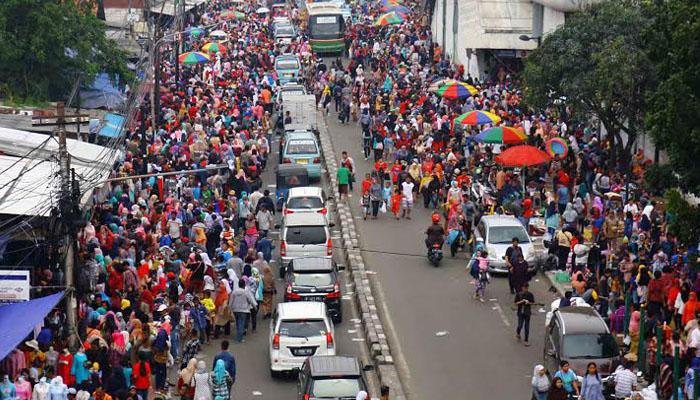Compliance to the new Supreme Court ruling may have a delayed response after the livelihood of street venders are up in the air
The crowded market district of Tanah Abang in Central Jakarta exemplifies the controversy over Jakarta’s sidewalks being used by street vendors and kaki lima (food carts). On the one hand, those sellers argue that their livelihoods depend on being able to use those public spaces to reach customers. Those opposed say that pedestrians and traffic are severely impeded by sidewalk vendors — a problem that is especially acute in Tanah Abang — and argue that sellers should be given space in properly regulated commercial facilities instead.
After authorities attempted to move the street vendors off of Tanah Abang’s crowded sidewalks to a newly constructed skybridge early this year, only to be chased off with violent resistance by the district’s infamous preman (thugs), who earn their livelihoods by illegally profiting off of street vendors, Jakarta Governor Anies Baswedan returned to his previous position of giving street vendors permission to conduct business on Tanah Abang’s streets.
However, that will hopefully change in the near future after a court ruling removed the governor’s ability to legally sanction street vendors.
Recently, William Aditya Sarana, a member of the Jakarta City Council from PSI (the Indonesian Solidarity Party, one of the youngest and progressive political parties in the country) won a Supreme Court case in which he challenged an article in the 2007 Regional Law on Public order that gave the governor of Jakarta the authority to close roads and sidewalks for use by public traders.
The Supreme Court judges agreed with William’s argument that the law conflicted with article 127 of the 2009 Law on Traffic and Road Transportation, which stipulates that roads and sidewalks can only be closed for religious, state, sport and cultural activities, and thus should be nullified.
Although the Supreme Court ruling does not mandate a timeline for when the Jakarta Government must comply with the ruling, William and PSI are pushing for Governor Anies to comply with it immediately by not only rescinding the permission he had given to street vendors but also accommodating them with proper commercial space for their businesses.
“Street vendors should be placed in safe places, in accordance with the rules so that they can trade and make a good living. At the same time it is also important that we fight for the rights of pedestrians who have not been denied their rights in this city,” William said at a press conference yesterday, as quoted by Merdeka.

